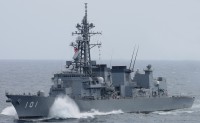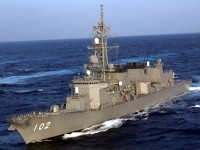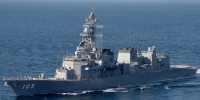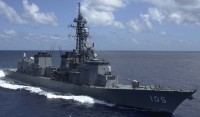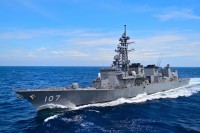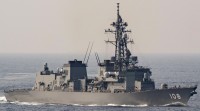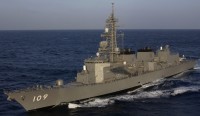Murasame-class destroyer
Basic information
Ship measurements
Machine
- 2 * Ishikawajima Harima Industries (IHI)/General Electric LM-2500 gas turbines
- 2 * Kawasaki/Rolls-Royce Spey SM-1C gas turbines, 60000 shp (45 MW)
- 2 * shafts / 2 * controllable pitch propellers
Personnel
Combat assets
- OYQ-9 Combat Direction System (CDS) — composed of 1 * AN/UYK-43, 1 * AN-UYK-44 and AN/UYQ-21 workstations
- OYQ-103 anti-submarine warfare control system
- OPS-24B active electronically scanned array radar
- OPS-28D surface search and target acquisition radar
- OPS-20B navigation radar
- FCS-2-31 fire control system
- NOLQ-3 ECM/ESM intergrated electronic warfare system
- OQS-5 hull sonar
- OQR-2 towed array sonar
- ORN-6C Tactical Air Navigation (TACAN)
- Mk-36 SRBOC jaff & decoy launcher
- AN/SLQ-25 Nixie torpedo decoy system
- 1 * Oto-Melara 76mm/62-caliber super rapid gun (3-inches)
- 1 * Mk.41 Vertical Launching System / VLS (16 cells) for up to 16 RUM-139 VL-ASROC
- 1 * Mk.48 Mod.0 Vertical Launching System / VLS (16 cells) for 16 RIM-7 Sea Sparrow or 32 RIM-162 ESSM SAM
- 2 * Mk.141 missile launcher for 8 Type 90 SSM-1B anti ship missiles
- 2 * Type 68/HOS-302A (Mk.32) 12,75-inch (324mm) triple torpedo tubes for Mk.46 or Type 73 torpedoes
- 2 * Mk.15 Phalanx Close-In-Weapon-System (CIWS)
- 1 * SH-60J/K Seahawk anti-submarine helicopter
The Murasame-class destroyer is a class of destroyers, serving with the Japan Maritime Self-Defense Force (JMSDF). This is the first class of the second-generation general-purpose destroyers of the JMSDF.
The hull design was completely renovated from first-generation DDs. In addition to increasing the size in order to reduce the underwater radiation noise, both superstructure and hull was inclined to reduce the radar cross-section. There is however no angled tripod mainmast like the one of the American Arleigh Burke-class destroyer because of the heavy weather of the Sea of Japan in winter. The aft was designed like a «mini-Oranda-zaka» as with the Kongō class to avoid interference between helicopters and mooring devices.
The engine arrangement is COGAG as same as Asagiri class, but a pair of engines are updated to Spey SM1C. And the remaining one pair are replaced by LM2500, same as Kongō class.
The basic configuration of the equipment is the same as first-generation DDs, but they are updated and enhanced throughout. Concepts of its combat system were partly based on those of Kongō class. Two large-screen displays and OJ-663 consoles are introduced in its OYQ-9 combat direction system as Aegis Weapon System (AWS). And OYQ-103 ASW combat systems, based on OYQ-102 of Kongō class and indirectly AN/SQQ-89, presents an integrated picture of the tactical situation by receiving, combining and processing active and passive sensor data from the hull-mounted array, towed array and sonobuoys.
The advanced OPS-24 active electronically scanned array radar and OPS-28 surface search and target acquisition radar introduced into the fleet with the latter batch of the Asagiri class remains on board, and there are some new systems such as the NOLQ-3 electronic warfare suite and OQS-5 bow mounted sonar.
To enhance the low-observability and combat readiness capability, vertical launching systems were adopted on its missile systems: Mk 41 for VL-ASROC and Mk 48 for Sea Sparrow replace the traditional swivel octuple launchers. And the surface-to-surface missile system is alternated by the SSM-1B of Japanese make. Currently, ships of this class have been switching the point defense missile system from the traditional Sea Sparrow (RIM-7M) to the Evolved Sea Sparrow by FY2012.
Aircraft facility is expanded to accommodate two shipboard helicopters. One Mitsubishi SH-60J/K is a basic load, and another can be accommodated in case of overseas operation.
Ships9
- Comments
 en
en ru
ru uk
uk
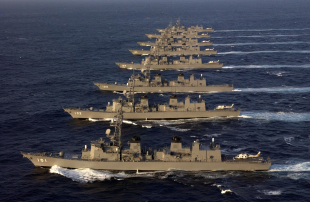
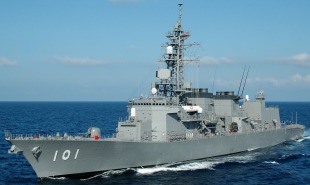

 Japan Maritime Self-Defense Force
Japan Maritime Self-Defense Force